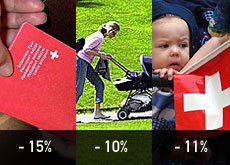Voters decide on citizenship and maternity benefit

Voters in Switzerland are this weekend deciding on plans to ease citizenship restrictions and to introduce statutory maternity benefits nationwide.
The proposals, which are opposed by the rightwing Swiss People’s Party, would bring Switzerland in line with other western European countries.
The government, parliament and three of the four main political parties want to make it easier for young foreigners to become Swiss citizens.
The proposal envisages speeding up the naturalisation procedure for people aged 14 to 24, and granting automatic citizenship to children born in Switzerland of foreign parents, provided they meet certain criteria.
The proposal also foresees standardising the regular citizenship procedure across the country. This would reduce the minimum residency period required before one can apply for citizenship and set maximum fees for citizenship applications.
Opponents say the proposal would undervalue Swiss citizenship – “which should be earned” – and they accuse the government of trying to cover up the failures of its immigration policy by forcibly reducing the number of foreigners.
Integration
However, supporters underline the importance of integrating young foreigners into Swiss society by giving them full political rights. They also point out that Switzerland has very restrictive and complex citizenship rules.
A majority of voters appears to be in favour easing the rules, but polls show opposition to making it easier for young foreigners to become Swiss has been increasing in the past few weeks.
The number of so-called second- and third-generation foreigners – children and grandchildren of immigrants mainly from Italy, Turkey and the Balkans – has risen considerably in Switzerland over the past two decades.
Twice before Swiss voters have rejected similar proposals to ease the country’s restrictive citizenship rules.
Mothers
Another controversial issue before the public is the introduction of statutory maternity benefits.
Gainfully employed women would be eligible for 14 weeks’ paid maternity leave, if the vote clears the final hurdle at the ballot box.
Currently it is mainly up to individual employers whether they pay maternity benefits, although the principle was enshrined in the Swiss constitution more than 50 years ago.
Many large private companies and employers in the public sector have implemented maternity leave schemes voluntarily, but women in unregulated branches of industry have no entitlements.
Supporters say a nationwide solution is overdue and would lessen the burden for the economy, while opponents argue the scheme is too expensive and would prompt tax increases.
Latest opinion polls suggest voters are likely to approve the proposal after three previous plans failed to get the approval of the electorate.
Postal services
A third issue to come to a vote is a proposal to slow down the restructuring of the state-owned Post Office.
The government, parliament and the main parties, except for the centre-left Social Democrats, have come out against the initiative by trade unions and the country’s leading consumer group.
The Post Office management said cutbacks were necessary to remain competitive in the liberalised market but promised that it would continue to keep up a nationwide post office network, notably in remote mountain regions.
Opposition against the Post Office restructuring, including the closure of up to 800 subsidiaries, is particularly strong in rural areas as well as in the French- and Italian-speaking parts of the country.
Out of line
Political analyst Jeremias Blaser from Fribourg University says the votes on maternity and citizenship can be seen as moves to bring the country in line with other Western European states.
“In an international comparison, Switzerland’s citizenship policy has been rather restrictive. As far as maternity insurance is concerned, Switzerland’s welfare system is underdeveloped compared for instance with France,” said Blaser.
He adds that Sunday’s vote is likely to be seen as fundamental by voters. “It is less a matter of party politics but more a vote on what role the state should play,” he said.
He added that he would not be surprised if the main winners of last year’s parliamentary elections lost one the forthcoming votes.
“The People’s Party as such is not united either in its stance, and it faces such a broad coalition from the Left to the Right, parliament and the government.”
swissinfo, Urs Geiser
Voters are to decide on easing rules for Swiss citizenship, introducing statutory maternity benefits and slowing down restructuring plans for postal services.
The rightwing Swiss People’s Party is the only major political party campaigning against the citizenship and maternity benefit proposals.
Latest opinion polls predict a majority of voters coming out in favour of easing citizenship rules and paid maternity leave.

In compliance with the JTI standards
More: SWI swissinfo.ch certified by the Journalism Trust Initiative













You can find an overview of ongoing debates with our journalists here . Please join us!
If you want to start a conversation about a topic raised in this article or want to report factual errors, email us at english@swissinfo.ch.